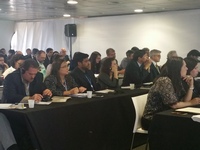 | Enhancing capacities in international Internet governanceThe International Telecommunication Union (ITU) in partnership with DiploFoundation strengthened the capacities of the ITU membership in the field of international Internet governance. A workshop, hosted by the National Telecommunications Agency of Brazil (ANATEL), took place in Brasilia, Brazil, from 14 to 16 August 2017. - Capacity-building is part of ITU's mandate and ITU plays a leading role in the training of strengthening capacities in international Internet governance. The training encompassed nine different sessions addressing relevant Internet governance issues: digital policy priorities, key guiding principles that shape Internet governance, digital transformation, human rights and democracy, the concept of multi-stakeholder governance, the importance of policies to tackle problems, the critical needs of ICT infrastructure development, connectivity, Internet of Things and emerging challenges. The training put an emphasis on the catalytic role of ICTs as a powerful enabler to achieve the 2030 Agenda for Sustainable Development.
Fifty-five participants benefited from the capacity training. This included attendees from Dominican Republic, Guyana, Haiti, Paraguay and Trinidad Tobago. Participants engaged in capacity-building activities on global ICT policy, with special focus on improving developing countries' participation in the existing Internet governance institutions, and other issues related to the improvement of ICT infrastructure, services and regulations.
As a result of this training for capacity development, participants acquired a broad knowledge, and captured some of the important facets of Internet governance. These included governance models of Internet names, numbers and standards, and important cybersecurity topics, such as critical information infrastructure protection and how to counter cybercrime. The course also covered digital business models for economic growth and the use of big data for development. It taught participants how to develop legal instruments and how their role in Internet governance such as international agreements, national laws, private contracts can play a significant role to fast forward development.
This training, offered under the umbrella of the ITU Academy, highlighted key priority areas and needs for capacity development in Internet governance in the region.
As we live in today's digital world which is becoming more connected, building both human and institutional capacity in international Internet governance is critical to builde more inclusive digital societies.
Further information can be found
here.
|
|
 |
CARIBBEANCybersecurity and CyberDrill in Suriname: A Caribbean Perspective In 2003 and 2005, during the World Summit on the Information Society (WSIS), government leaders and other stakeholders entrusted the ITU to take a leading role in coordinating international efforts on cybersecurity by making ITU the sole Facilitator of WSIS Action Line C5 on “Building Confidence and Security in the use of ICTs”. ITU and its partners launched the Global Cybersecurity Agenda[1], and initiated activities related to the establishment of National Computer Incident Response Teams (NCIRT)[2]. The cybersecurity programme of ITU assists countries in building their national capacity to respond to cybersecurity related incidents and establishes solutions as well as processes/procedures to better protect their national critical infrastructures against cyber threats. -
Furthermore, the World Telecommunication Development Conference (WTDC-17), held in Buenos Aires in 2017 reinforced ITU’s commitment on cybersecurity through the adoption of Resolution 69: "Facilitating creation of national computer incident response teams, particularly for developing countries, and cooperation between them[3]". As part of its commitment, ITU organizes regular regional cyber-drills to improve coordination among the different National CIRTs within the same region.
Within this mandate, ITU, in collaboration with the Ministry of Transport, Communication and Tourism of Suriname, the Telecommunications Authority Suriname (TAS) and other partners, jointly organized the Caribbean Cybersecurity & CyberDrill from 3 - 7 July 2017 in Paramaribo, Suriname. Close to 100 participants attended the forum and technical training to help 8 countries from the region enhance confidence and security in the use of ICTs[4]. Dominican Republic, Grenada, Guyana, Montserrat (UK), Turks and Caicos Islands (UK)Saint Vincent and the Grenadines, Suriname, Trinidad and Tobago, and the USA.
The event focused on technical cybersecurity training and its relevance in the Caribbean, the creation and usage of CIRTs, particularly in the event of a cyber-attack, and included a panel discussion detailing cybersecurity threats faced by Latin America and the Caribbean. Fifty-three participants were trained on the establishment of a National CIRT, and all participants reported more than 95% satisfaction.
The Caribbean Cybersecurity & CyberDrill resulted not only in a successful dialogue among Member States on cybersecurity, exchange of knowledge, and best practices, but also in an increased capacity of the Member States to implement cyber security policies and strategies for efficient cybersecurity response.
Cybersecurity remains a global borderless issue, affecting every nation, especially as cyber threats are becoming more and more complex and difficult to eliminate. ITU and its partners are committed to strengthen international partnerships for building confidence and security in the use of ICTs.
|
|
 | ZIMBABWEEmpowering the Women’s Farming Syndicate in Zimbabwe through ICTs
The Women's Farming Syndicate is a women's farmers organization based in Zimbabwe, a landlocked developing country located in Southern Africa. The organization is engaged in various agricultural activities across the country with a representation in more than 150 communities. Their goods include sugarcane, maize, sorghum and other small grains, coffee, tea, millet, paprika and turmeric among others.
[1] - Since 2017, the Farmers Syndicate has two Women's Showcase Markets every year. These create a platform for knowledge exchange, sales, marketing, cultural exchange, employment creation, food security, women's economic empowerment, revival of rural economies, foreign currency generation and quantification of women's contributions to economic development. They firmly believe that the revival of the Zimbabwean economy will be led by women and with every support, the women of Zimbabwe will be able to succeed in transforming the nation for future generations through sustainable empowerment platforms.
However, they face many challenges, including the lack of ICT skills and training among women farmers
[2]. To help the Women's Farming Syndicate reach a wider market to sell their products, the Ministry of ICT of Zimbabwe requested ITU to develop an online interactive platform to enable women to display their products through an online catalogue, a directory of all the different exhibitors, an online store, a photo and video gallery of all goods and a live chat to interact with customers and other sellers. As a result, from 1 September 2017 to 31 December 2017, the ITU's regional office for Southern Africa, provided a training that included two components: (1) Train the Trainers of the Community Information Centre. (2) Website development for Women's Farmers Syndicate in Zimbabwe.
Forty trainers who managed the Community Information Centers were trained to help marginalized women farmers access public information through technology making them more efficient and productive. This initiative also enables them to participate in the fair-trade market with a more equitable and fair price for their products, and better trading conditions which will help them improve their lives. The development of this interactive platform, and the acquired skills empower women at the base of the pyramid, mainly rural women in their different activities, such as e-commerce for their economic development.
The empowerment of women and girls through ICTs is one of the ITU's priorities to improve their lives especially rural women across the world. ITU is working to bridge the gender digital divide towards everyone's right to communicate through access ICTs. Furthermore, it is in line with the global effort to achieve the 2030 agenda, SDG goal 5 and target 5b that underscores the need to "Enhance the use of enabling technology, information and communications technology, to promote the empowerment of women".
The ITU 2017 ICT Facts and Figures on Internet penetration rate for men and women shows that the proportion of women using the Internet is 12% lower than the proportion of men using the Internet worldwide. The gender gap has widened in Africa where the proportion of women using the Internet is 25% lower than the proportion of men using the Internet
[3]. Thus, it is important to harness the power of ICTs to empower women worldwide, specifically in Africa where the situation is more acute among rural women.
|
|
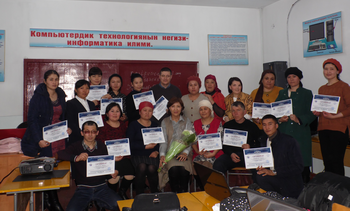 |
KYRGYZ REPUBLIC
Enhancing teachers skills in IT and informatics
in the Kyrgyz Republic The Kyrgyz Republic, a landlocked developing country in Central Asia, has been able to use information and communication technologies (ICTs) to improve its education system.
-
Despite the progress it had made, the country continues to face a number of challenges, including a shortage of teachers and educational materials. By early 2018, just over 50 per cent of schools in Kyrgyzstan are connected to the Internet
[1] and many teachers lack the necessary IT skills to benefit from new technologies, or to teach their students. This has led to disparities in learning outcomes, in particular between remote and urban areas. [2] To address these challenges ITU, in collaboration with the Institute of Electronics and Telecommunication, of the Kyrgyz State Technical University, has delivered hands-on information technology (IT) training courses to teachers in remote and rural areas. By enhancing teachers’ technical expertise and developing their digital literacy skills, these teachers have been able to transfer their newly acquired knowledge to their students, improve content development and the way they organize their classroom work. Trainings have been delivered every year since 2012, when a very positive feedback from the rural schools, whose teachers completed the trainings, led to a continuation of the training courses. So far, rural schools in Batken, Jalal Abad, Issyk Kul, Nary, and Chui Region have benefitted from the five-day training, which take place in the Issyk Kul region.
In 2017, ITU organized 6 training courses, and trained an additional ninety-five rural teachers, including 75 women. The two training courses had two different levels of complexity. The first covered the topic of the “Basic Principles of Information and Internet Technologies” and 82 teachers, including 69 women, completed this course. The second training was on the “Basic Principles of Algorithm Development” and 13 school teachers, including 6 women, were trained. More than 80 per cent of participants passed the final 2017 tests. [3] Since then, more teacher have requested further courses, including to acquire programming skills. Furthermore, other regional education centres have expressed their interest in additional training courses targeted at non-informatics teachers in rural schools. These additional trainings will directly benefit school children, as well as their families.
ITU is committed to continue supporting capacity-building and knowledge sharing to help everyone to become part of the global information and knowledge society.
|
|
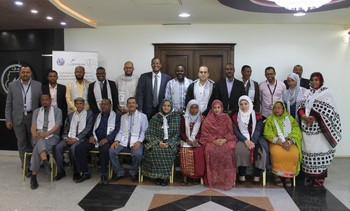 | ARAB STATESBuilding human and institutional capacity on Internet Protocol version 6 (IPv6) in the Arab States’ Least Developed Countries (LDCs)IPv6 promises to provide about 340 undecillion IP addresses that ensure the availability of new IP addresses reaching far into the future, and to promote expansion of innovative solutions. -
With the exponential growth in digital services and mobile communication, the number of devices that require new Internet Protocol (IP) addresses has increased. Since every single device that connects to the Internet must have an IP address (similar to how people have IDs) IPv4 (the predecessor of
IPv6) has started to run out of address space and triggered the development of next-generation IP, which is IPv6. IPv6 promises to provide about 340 undecillion IP addresses that ensure the availability of new IP addresses reaching far into the future, and to promote expansion of innovative solutions.
Countries are strongly encouraged to deploy IPV6 for efficiency of the Internet, to increase the size of the address field, traffic, security, mobility and better management.
Many modern technologies and applications, such as the Internet of Things, big data analytics, massive sensor networks for data, business inventory, traffic monitoring, to name a few, will be empowered by IPv6.
It also means that countries need to technical know-how to deploy IPv6. Building human capacity is of utmost importance to increase knowledge, and building institutional capacity to enhance the competence of countries and to make institutions stronger for their development. The LDCs are in need of both and ITU, along with its partners - the Telecommunications Regulatory Authority (NRA) of the United Arab Emirates and the National Telecommunications Corporation (NTC) of Sudan- provided IPv6 trainings to six Arab LDCs: Comoros, Djibouti, Somalia, Sudan, Mauritania, and Yemen. Trainings were held from 26-29 December 2016 and 2-6 April 2017.
The courses included basics configuration and deployment of IPv6 networks, as well as more advanced Ipv6 routing, IPv6 mobility and IPSec and security consideration related issues. It also addressed challenges and best practices.
A total of 31 professionals, including eight women, completed the IPv6 training. People trained will be able to transfer their technological knowledge to others that can trigger a domino effect in the development and deployment of IPv6 for the future generation of the IP infrastructure. In addition, best practices and lessons learned can be replicated to serve other countries.
More information on the training is available in the training case study/report
[1].
|
|
  |
HAITI
ITU deployed emergency telecommunication equipment in Haiti
ICTs/ telecommunication services play a vital role when disasters strike. Communication systems and networks save lives by helping first responder to coordinate disaster management efforts. ITU assisted Haiti when the country was struck by Category 4 Hurricane Matthew on 4 October 2016. The Hurricane caused over 1000 deaths, disrupted critical infrastructure, including communication and transportation networks, and left the country in crucial need of aid. The emergency telecommunication equipment provided by ITU was used to support relief and coordination efforts and provided assistance in the global efforts to help rebuild networks and services. |
|

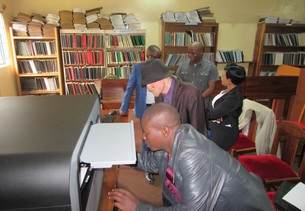 | ZAMBIA
Building institutional and human capacity - ITU helping blind school pupils in Zambia
In 2016, ITU assisted the Government of Zambia to empower more blind students in a digital world. As part of its efforts to provide technical support to schools for the blind, concentrated assistance in the form of braille printers, computers and software, were delivered to the regulatory authority, ZICTA, of Zambia. The equipment will be used by educational institutions for persons with visual impairments in Zambia and support blind students in their educational endeavors. |
|
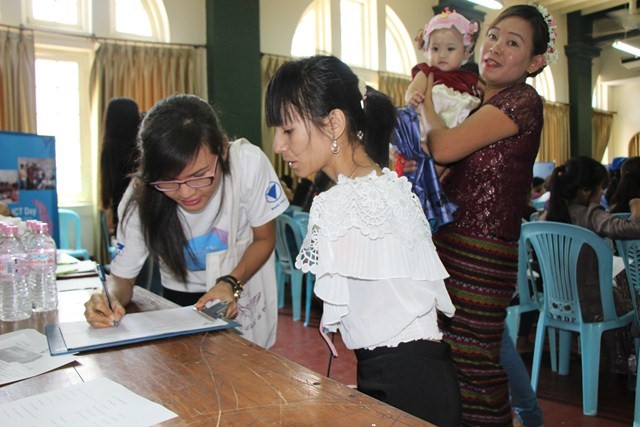 |
MYANMAR
ITU's advocacy to empower Women and Girls worldwide to bridge the gender digital divide - "Girls in ICT Day" ITU is actively engaged in promoting ICTs for women and girls. Once a year, it organizes the
Girls in ICT Day, an initiative to encourage girls and young women to consider studies and careers in the field of ICT.
On 28 April 2016, Girls in ICT Day was celebrated in Myanmar, where it brought together more than 200 participants. A special event was organized to highlight the use of social media for education, political, social, and networking purposes, and to showcase how ICTs can drive economic development and empower women and girls. |
|
